Archive for the ‘E-Books & Publishing’ Category
Another Wonderful eBook?
August 31st, 2010by Gwyn Headley
Managing Director
Readers may recall the troubles I’ve recently had with an enhanced ebook: The Guide to Birds of Britain and Europe.
Ever the early adopter, I rushed out and plonked my money down when the immortal Oxford English Dictionary was first published electronically in 1993. We didn’t use the word ebook back then.
It was merely called “The Oxford English Dictionary on Compact Disc”, and it came in a chunky A4 sized white plastic box. This was considerably smaller and lighter than the 16 volumes of the printed work, and of course somewhat cheaper, as well.
Inside the plastic box came a printed instruction manual, a floppy disk which contained the program and the necessary fonts, and a CD-ROM which held the data.
I can’t use it any more because it only runs on Mac OS 7, 8 and 9, and I no longer have a computer that uses those operating systems. Or a floppy disk drive.
But all is not lost. In June last year I had a cheery letter from Oxford University Press offering me, as a registered user of Version 1.0d, the Oxford English Dictionary 2nd ed — new Mac-compatible CD-ROM v4.0 on a Special Offer!
For a mere £149.25 more I would be able to read my version of the OED on a more up-to-date computer.
Of course for the same amount of money I could buy all 16 volumes second-hand from Abe Books.
And I wouldn’t have to chuck it away when Apple finally release Mac OS XI.
But now OUP have announced that the next edition of the OED may well be available only as an ebook — no print edition at all. So we’re moving to a situation where we will have to pay out regularly for upgrades to carry on using a necessary reference work.
It’s what the software and publishing giants have dreamed of. Books that expire after a certain time. After all, who is still using Photoshop I nowadays?
eBook Pricing
February 15th, 2010by Gwyn Headley
Managing Director
I needed to brush up on my SEO (Search Engine Optimisation) awareness so I thought I’d buy an ebook on the subject, instead of waiting around for the print version to arrive.
Because if anything’s got a short shelf life it’s going to be a book about how to improve your web site.
As I’m a member of a thriving LinkedIn community called “Ebooks, Ebook Readers, Digital Books and Digital Content Publishing” I thought I’d solicit the help of my fellow members and so I asked them “Can anyone recommend a good ebook about SEO? ANY ebook on SEO seems to be hard to find.”
They responded generously. I chose “SEO Warrior” by John Jerkowicz, for two reasons: it was the most recently published book on the subject (see comment above about short shelf lives) and it was published by O’Reilly, a trusted name in computer publishing.
It was suggested by Jill Tomich, the CEO of eBookPie, together with a link through to the page on her site where I could buy it: http://bit.ly/bLhQ7F. This was great. Just what I wanted. It was only $30.69.
But something made me pause. When I got my iPhone, I bought the O’Reilly “Missing Manual for the iPhone”. And it cost me £2.99. So I went to the iTunes store and found 600+ O’Reilly titles ranging from free (free is a price point) to £3.49. And there was “SEO Warrior” for £2.99.
Reader, I bought it.
Now everyone knows that O’Reilly are smart guys. Perhaps they can explain to me the following price structure for “SEO Warrior”:
Recommended retail price, USA:$44.99, UK £34.50
Print copy, Amazon USA: $29.69
Print copy, Amazon UK: £18.41
eBook, eBookPie USA: $30.69
eBook, iTunes App Store UK: £2.99
As an App developer myself (Aaron’s Time Machine: New York will very shortly be released) I know that Apple take 30% from the sale of any app. So what’s the thinking behind O’Reilly selling the same product (OK, in different formats) at prices ranging between $44.99 and $4.69? A near tenfold difference? How does the author feel about his royalty?
Please tell me. I’m really curious.
Yes, I feel bad about not buying it from Jill Tomich’s site, as she was so kind as to point me to it. But not as bad as I’d have felt if I’d paid $30 for the ebook and an hour later found it being sold for £3.
Kindle for the iPhone
January 13th, 2010Amazon announced a Kindle app for the iPhone a while ago; I’ve just got round to downloading it.
Now I’m a fan of ebooks. It’s a great concept, and therein lies the future — but I still have reservations. I don’t think there will be a tipping point from print to ebooks any time soon.
It won’t happen as quickly as many gurus hope it will, because
1. New ebook readers are announced daily. One format must achieve dominance, by which I mean 80%+ of the market.
2. That format has to do everything: colour, sound, movies, the lot
3. They are furiously expensive
4. We’re not there yet
Amazon famously announced that on Christmas Day more ebooks were downloaded than than they sold printed books. The future had arrived.
Well, durrr. Who is going to be on line buying books on Christmas Day? And who is more likely to be sitting in their solitary flat with the turkey pizza shoved under the door, endlessly scanning the internet for stuff to download?
Weren’t 8 out of 10 of their top selling ebooks all giveaways? How many of the print titles were free? I think we’ve been handed some spurious statistics here, and it’s been repeated all over the place.
The chatterati WANT ebooks to succeed. And of course they will. But a lot of people have got to get their acts together pretty damn quickly if it’s going to happen any time soon.
What prompted this? Well, I downloaded the Kindle app, and then I downloaded an ebook from Amazon.
And this is what I saw:
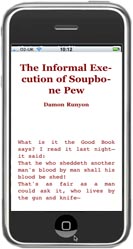
Well, I’m sorry — I gave up right away. There are graphic standards to keep to in this world, and I refuse to dumb down to
THE INFORMAL EXE-
CUTION OF SOUPBO-
NE PEW
which is beyond pathetic as any sort of commercial offering.
Keep trying, chaps. I’m sure you’ll make it eventually.
The ebooks that Neil Smith and I have produced for Aaron’s Apps are attractive, readable, innovative, colourful, non-linear, a new way of presenting a guide book, a new way of presenting history, and (though of course I’m saying all this myself) a genuinely new way of reading a book. These are guide books that follow YOU about, not the other way around. One huge illustration, eight feet by six feet, 160 pages which you can read in any order, and a nifty way to locate yourself in a city 200 years ago, as easily as today. Impossible to replicate in a printed book.
Now THAT’s what I call an ebook. The world should be beating a path to our door.

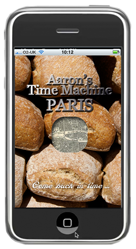
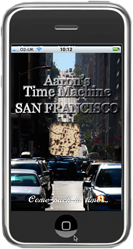
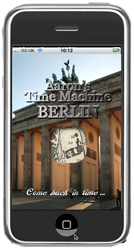
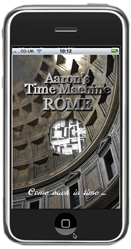
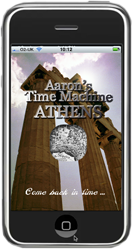
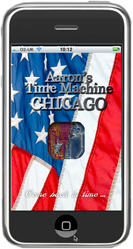
Orphan Books
December 23rd, 2009by Gwyn Headley
Managing Director
The New York Times has published its annual list of ‘buzzwords of the year’. Two have been derived from book publishing, in which fotoLibra has a vested interest as publishers constitute our largest single market.
The words are ‘Vook’ and ‘Orphan Books’. ‘Vook’ is a neologism and ‘Orphan Books’ is a phrase rather than a word, but we’ll let that pass. Let’s deal with Vook first: its etymology is a combination of Video and bOOK content, in other words the killer ebook I described in this blog post without using the word vook. More recently, I got rather excited by this ad for Sports Illustrated which pretty accurately delivered what I was looking for in an ebook, only as a magazine. So what would this be? A vazine? Videodical? A Vag (Video mAGazine)?
Anyway, the first time I ever heard the term ‘vook’ was when I read the article this morning. So I’m not aware of it as a buzz word.
Orphan Books are defined by the New York Times as “volumes still in copyright but out of print and unavailable for sale, and whose copyright holders cannot be found.” The article says that the term ‘Orphan Book’ first rose to prominence in 2007, but “peaked this year with the fierce discussion over the proposed Google Books settlement.”
Orphan Book has a completely different meaning for me and many other authors and publishers. The real Orphan Book is one that is orphaned at birth, a tragedy shared with genuine orphans.
When an editor commissions a book and leaves the firm before the book is published, that creates an orphan book. Within a publishing house, the editor’s rôle is to deliver the best product he can, and to do that he has to talk up his babies to publicity, sales, marketing and of course the board. His books are better than the books from the other editors in the house; they are more marketable, better written, more intelligent, bigger sellers, indeed seminal. Few can remain unimpressed at the sight of an editor firing on all 16 cylinders to promote a favoured author or title at a sales conference.
But if that editor is no longer there to defend and promote the title, what happens to the book? I can tell you from bitter experience — it’s forgotten. There’s a contract, so the company is obliged to issue the book, but because no one remaining in the company is interested, it is not so much published as released into the community.
Three of my books were orphan books: Follies: A National Trust Guide: commissioned by Robin Wright (died shortly afterwards) and Liz Calder (left to found Bloomsbury). Eventually published by Jonathan Cape, 1986.
Architectural Follies In America: commissioned by Buckley Jeppson of the Preservation Press. Buckley left, the company was acquired by John Wiley & Son and the book was eventually published by them in 1996.
The Encyclopaedia of Fonts: Commissioned by Jane Ellis. Jane left over a year before a new managing director eventually allowed the book to trickle out in mid-December. Eventually published by Cassell Illustrated, 2005.
So where does the New York Times get Orphan Books from, to mean this quasi-legal grey area? From Google, of course. Google is not a book publisher and does not use a book publishing vocabulary, so it created this term to describe what is in fact a minute sector of the market. How many titles are we talking about in Google’s definition of an ‘orphan book’? How many books are there where the copyright holders cannot be found? Who is looking for them? How hard are they looking?
If I owe somebody money, they always manage to find me. But if money is owed to me, the difficulty of tracking me down becomes exponentially greater. Creating a snappy phrase — even by appropriating one that’s already in use within the trade for a common occurrence — gives visibility to an otherwise overlooked and unimportant sector of the market.
And interestingly it might help to divert attention from much larger, yet less transparent, activities being carried on elsewhere.
The Killer eBook Is Nearly Here
December 10th, 2009by Gwyn Headley
Managing Director
Tags: American, baseball, ebook, emagazine, gridiron, killer ebook, Sports Ilustrated
Avid readers of this blog (me) will remember that last March I posted a wish for an ebook that actually did what I thought an ebook should do. The piece was titled “The Killer Book For eBooks” and in it I described what I expected to get from an ebook. And what the Kindle was dismally failing to do.
Well, I’ve just seen it. And it’s come from a most unlikely source: the American periodical Sports Illustrated. So it’s an emagazine rather than an ebook, but it’s almost exactly what I described. It’s not yet available, so I have no idea of timescale or cost, and American sport is incomprehensible to me and the rest of the world, but watch this video and you’ll get the picture.
The timescale and costs are irrelevancies to anyone but the earliest of adopters. What I know is that it will be here soon, and it will get cheaper soon. And in ten years’ time we’ll come across the device mouldering in the back of the garage and smile to remember how impressed we were with it at the time.
Free iPhone App: Aaron’s Time Machine
November 27th, 2009by Gwyn Headley
Managing Director
Tags: Aaron's Time Machine, app store, apps, iphone, iphone apps, iPod Touch, London
This isn’t strictly fotoLibra business, so I’ll simply refer you to the fotoLibrarian blog where this fantastic free offer is soberly and modestly described: http://fotolibrarian.fotolibra.com/?p=251
UK Politicians Not Entranced By Ebooks
November 22nd, 2009In BBC’s Question Time, recorded in affluent suburban Chorleywood, the panelists were asked if they liked the idea of ebooks.
Harriet Harman said No — you can’t lend a book you like to a friend.
Tristan Hunt said Don’t lend books — buy them! (He has just had a new book published).
Philip Hammond said No — you can’t hide behind them on the tube.
David Steele (the oldest panelist) thought the ebook was a rather good idea.
Chairman David Attenborough asked the questioner how she felt. She hated the idea.
Then he asked the audience. Amid laughter, he announced the result was that “they are not going to sell very well in Chorleywood.”
Prophecies and Prophets
August 27th, 2009by Gwyn Headley
Managing Director
Tags: books, clusterfuck nation, e-books, ebooks, guru, Mike Shatzkin, predictions, prophecies, prophets, publishing
There used to be a stable of magazines in London all with the same name format: Books and Bookmen, Art and Artists, Dance and Dancers. I wonder if they’d have been interested in Prophecies and Prophets as a title.
I was musing on this because this weekend our good friend Mike Shatzkin is coming to stay. He describes himself as a publishing consultant, others call him a publishing guru, I like to think of him as a publishing prophet. He would probably refute this. Few people have ‘Prophet’ on their calling cards (though I did meet a gent from Microsoft who had ‘Director of Publishing Evangelism’ as his job title on his cards). Mike is very keen on e-books, and sees them as the future; I’m keen, but not quite as keen, and see them as part of our future.
The best prophets are inevitably Jewish. Mike proudly claims to be a fourth generation atheist.
Was Mohammed Jewish before he started Islam? (there’s a good example for never starting something you can’t stop). Prophets of Doom. Only Jesus prophesied Good News, and even then only after you were dead. St Paul took a more pragmatic view: ‘where there are prophecies, so they shall vanish away.’
What’s the difference between prophecies and predictions? Prophecy has a more religious ring to it, but the best predictors have to be viewed as prophets. They certainly attract their followers. Jim Kunstler’s Clusterfuck Nation blog, always a good read, works hard to present Jim as a prophet, with links to his literary agent, movie agent, lecture agent, ad agent and so on. Perhaps the more dogmatic and absolute the prediction, the more likely it is to be viewed as a prophecy,
On the whole maybe we’d better keep on regarding Mike as a publishing consultant. No serious prophet should stick around to see if his prophecies will come true. And nobody got rich by prophesying good news.
Primary School Books
July 10th, 2009by Gwyn Headley
Managing Director
I visited a primary school today to look through their text books to see which publishers needed to use fotoLibra.
They showed me fourteen text books published by Heinemann, Ginn, Longman, Oliver & Boyd, BBC Active, Pearson and Marshall Cavendish.
The books were largely published between 1991 and 1996, long before any of the children at the school were born. Only one of the books was published this century, in 2001.
With the exception of Marshall Cavendish, all the imprints I saw are now part of one company.
Luckily, we supply images to them.
I noticed two of the books mentioned Tenochtitlan in Mexico City. We recently sent out a picture call for images of Tenochtitlan, without any luck. We still want them!
Getting Ready for e-Books and Graphics
May 15th, 2009by Gwyn Headley
Managing Director
Amazon’s Kindle is now allowing blogs to be posted. Here’s one user’s experience, which can be read in full at http://www.daniweb.com/blogs/entry4341.html:
When I looked at the preview of what my blog looked like in the Kindle after adding my first blog to the system, I was shocked at the terrible quality.
First of all, it was black and white. My blog has pictures and on the Kindle they were not just black and white, they were low resolution black and white. It changed my carefully chosen font to a Times New Roman. In short it looked horrible. Sure, you can get away with a black and white eBook Reader for books, but if you are going to add other content, you need it to be full color or it just looks ghastly (or you are asking bloggers to come up with a special Kindle design, which is an unreasonable expectation).
It was at that moment, staring at that horribly ugly preview of my blog that it hit me. This is clearly a job for Apple.
Rumours of Apple working on an e-book reader have intensified over the past few months. Would it be like a big slender iPhone? Will it actually come? Or is this just wishware?
To many people, me included, the look and feel of a thing is as almost as important as the content. If I see my work in Times New Roman (a wonderful typeface, drowned by ubiquity) I feel physically sick. Fonts are the clothes words wear, as I quoted in my Encyclopaedia of Fonts.
And from fotoLibra’s point of view, the sooner we have colour e-books the sooner we can sell images to e-book publishers.
It will happen. So we are preparing for it.

